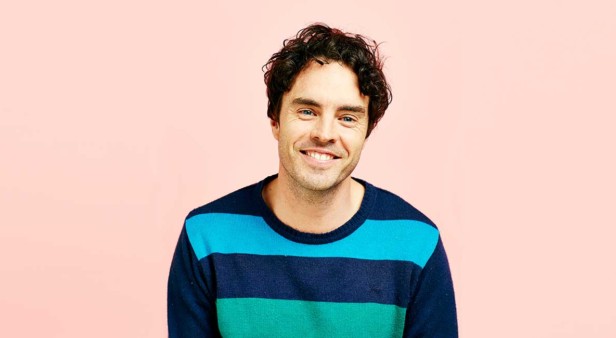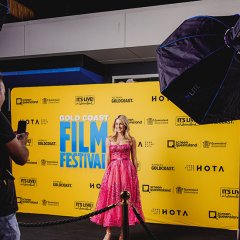We’ve seen documentaries released in the past about the dangers of a high-sugar diet, but That Sugar Film focuses on the sugar levels in perceived ‘healthy’ foods. How did you develop that angle?
I was with a couple of friends and we had an idea for seeing how my body would react if I just ate hospital food for a month … and then that morphed into sugar. I guess everyone knows if you have a diet of Skittles and Fanta you’re going to get sick, but I remember being at the supermarket and picking up a tomato soup and it had about seven teaspoons of sugar in the can and I thought, why does that need to have sugar in it? And so I wondered if you could do an experiment eating all those types of food that have hidden sugars in them, and it just grew from there.
Which foods surprised you the most?
I think quite often a lot of the low-fat products are the ones that have sugar in them because the companies have had to remove the fat and replace the flavour – so often they put in sugar. Yoghurt is a big one and also drinks like smoothies, iced teas, flavoured milks and sports drinks, and condiments like low-fat mayonnaise, barbecue sauce and tomato sauce are all really high in sugar, which you’d never really think of.
You had some pretty big names making cameos in the documentary, like Hugh Jackman and Stephen Fry. How did you get those gents involved?
Hugh came on really early – he was one of the first people to be involved in the film. He obviously takes pride in his appearance and body, so he already eats a lot of protein and healthy fats and not much sugar or refined carbohydrates, so he was very into the message. And he could tell we were aiming it at kids so we wanted it to be fun, playful and upbeat, and not too dry or academic. Stephen Fry came on board at the last minute. We sent him a document outlining the film and he said, “Look, I’ve had a sugar addiction since I’ve been a child and it’s something very real for me and I’d love to help out in any way”. We were very grateful.
You really put your body through hell during the experiment – not only were you gaining serious weight, but your internal organs were also copping a beating. At what point were you most afraid of what the effects might be?
Towards the end, I guess, because I developed the fatty liver disease so quickly. We were checking my blood more regularly, just to make sure nothing too serious happened – and certainly by the end, we’d reached that point where all the doctors and scientists said, “Look, it’s enough”. They didn’t want me to even go on for another couple of weeks because my liver was very close to hardening and it’s very hard to come back from that point. And I was also aware the whole time that Zoe was pregnant and may have our baby prematurely – that was a big concern for me because I obviously wanted to be there and I had this fear that I was going to miss out and be this overweight, grumpy father. So there were a few moments when I certainly questioned what the hell I was doing!
As you made the change from that high-sugar diet to sugar-free eating, it looks like it was a fairly quick recovery but you were effectively going through a withdrawal period, like any addiction. What were some of the hardest moments during that process?
The advantage I had was that I’d been on a sugar-free diet before so I knew what I was going back to and I really preferred that healthy person, so I was excited to be on that path again and eating those foods. A lot of people haven’t had that experience so it can be quite confronting if they want to lower their sugar intake. A lot of people do rely on sugar – it has emotional ties and the endorphins in our brain make us feel comforted, so it can be really hard. It also takes a few days for your palate to adjust, even a week. I guess many people have had sugar in their diet since they were children so they might not have ever really experienced two or three days of not having it, and what that feels like. Especially when it comes to tastebuds, sugar can have a numbing effect, as I found, so once you get rid of it then you start noticing new flavours in natural foods again – you can even taste the sweetness of a banana or sweet potato. Nature has designed certain foods to be sweet but we’ve put booster rockets on what is ‘sweet’.
Do you have a personal favourite moment in the film?
I think probably one of the most powerful statements was from Gary Taubes, who’s been researching this area for years and has always focused on refined carbohydrates. So for him to say that in all his research, you might think that sugar is the problem and everything else becomes relatively harmless without it in the diet – that’s a very powerful statement. Whether that’s true or not, time will tell. But he’s someone who takes his research very seriously, he’s very well respected for how thorough he is, so for that kind of fact to come out of his mouth – it obviously has some gravity.
Ours was possibly the closing montage of you in your bright-orange undies …
Yeah I still don’t know about that one! Quite often at the Q&A screenings now I have to watch the last five minutes of the film, and I must admit when it gets to that bit I usually have a little bit of a cringe … My poor daughter when she gets older!
What’s the response at the Q&A screenings been like so far?
It’s been incredible! We’ve pretty much sold out the whole country for the Q&A screenings and we’ll be opening the film in 30 different cinemas across Australia after the Q&As too. All the cinemas have been really excited by the response to it, so it’s getting played as a normal film, which we never dreamed of six months ago. People who have seen the film have been very positive about it on social media too – it feels like they’re leading the drive, which I always hoped for. We didn’t want to make a film where people got scared and felt fearful, we wanted them to leave the cinema saying, “I can go home and actually take action and start looking at labels and be empowered”. It feels like people are doing that, so it’s great!
What were your biggest challenges in making the film – were there any issues with naming particular products?
We did have some lawyers look at a few of the edits, but the fact is, I’m only telling the truth. All I’m doing is deciphering the labels, which can be quite tricky for some people to read. I think that raises a bigger question about whether we make labels easier for people to understand – do we keep using grams or do we switch to teaspoons? At the moment, it’s very hard to decipher those labels and I guess that’s why people are so shocked when they learn how much sugar is in these foods. I certainly call for a lot more transparency in the market.
The documentary also introduced us to the community action group of Mai Waru in Amata, South Australia. What can you tell us about the Mai Wiru Sugar Challenge Foundation you helped establish?
That’s basically a funding stream – people can go to the film website and give any donation over $2 and that will go towards programs to train some of the local Amata people about food, and then they’ll be employed in local stores full-time to take other people around and help them spend their money on smarter food choices. They’ll also put up diagrams in the store to explain sugar content and help empower the people. They were doing such a great job and then they lost their funding, so we just want to continue the work they were doing – we want to get that back on track.
The movie is very playful with film clips and animation – was that an intentional decision to make it more accessible to kids?
Yeah, definitely. And even for adults, quite often documentaries can be a bit dry and academic. The people I wanted to see this film might not necessarily see a documentary, so we wanted to get this film to them – for them to take their kids to the movies, have a good night out, a laugh and also learn something at the same time. That’s probably been the most overwhelming thing at the Q&A screenings so far – we had one in Melbourne last night and there would have been about 500 people there with 30 kids under the age of ten. They were asking questions at the end and wanting to know more about sugar, so that’s been very exciting for me. We’ve started having school screenings and we’re about to release an action kit for schools on the website too; it includes a copy of the book and DVD, a study guide for grades 5 to 10 and a free app. The response from the kids has been really exciting – if you can change the eating habits of that generation before it’s too late, then obviously we can have a far healthier future for these kids.
Your girlfriend Zoe’s pregnancy inspired you to make this documentary. What kind of world do you hope your daughter grows up in?
I hope that her definition of ‘sweet’ is a very different thing to what we see now – that there are more options available and that the more we adjust our palate as a society and start to appreciate these kinds of flavours, that people aren’t ostracised or made to feel weird if they choose to cut down on their sugar. And of course I hope that school is a very, very safe place for her – kids get 37% of their daily energy from the school tuckshop, so I hope the tuckshop looks vastly different in five years and we don’t see as many sugary items so that these kids and my daughter have a better chance to really learn and concentrate because they’re not going up and down with all the sugar highs and lows.
The film is one hour and 41 minutes, but if you could convey your message to the public in just one sentence, what would you say?
That the film isn’t about demonising sugar – it’s saying look, the World Health Organization recommends we should be having somewhere between six and eight teaspoons a day, and we’re currently having somewhere between 30 and 40 teaspoons a day – so if we can get down to that first number we’re going to see some massive changes. It doesn’t mean you can’t have a bowl of ice-cream at the end of the day, but maybe don’t have the apple juice and low-fat yoghurt as well as the ice-cream, and you’ll start seeing bigger results very quickly.

